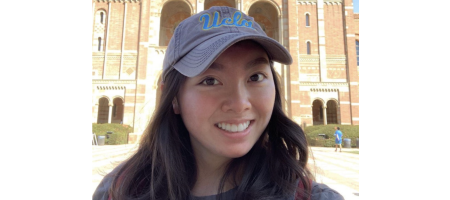Student Spotlight – Sara Wang
Meet UCLA undergraduate researcher Sara Wang!
Sara Wang majors in Political Science and participates in our Undergraduate Research Scholars Program! The title of her project is “Majoritarian Interests and Non-majoritarian Institutions: A Case Study of the Supreme Court and Public Opinion on Abortion.” Her work explores the extent to which Supreme Court decisions are responsive to public opinion on abortion. Her best piece of advice is to find a topic that speaks to your interests!
How did you first get interested in your research project?
Out of personal and academic interest, I closely followed Supreme Court cases for years. Concurrently, I studied the subsequent public reactions to rulings on salient issues. By the time I considered pursuing a thesis, one landmark case skyrocketed to the center of public attention. Roe v. Wade (1973) faced its greatest potential, in decades, of being overturned by the Court. I watched as a leaked draft of the Dobbs v. Jackson decision sparked outrage, from social media to the streets. It seemed that a strong majority of the public opposed the Dobbs decision. However, the books and polls that I studied told a slightly different tale. These sources claim that the public has historically bulked in the middle, disagreeing with an outright ban on abortion but agreeing that some restrictions can be placed. There was also the issue of the Court: whether justices tend to vote along ideological lines or if they may be influenced by the public to vote counter to their own ideology. A myriad of explanations, and contradictions, exist for why justices behave the way they do. I was determined to resolve these questions. And so, I spoke with my now-advisor, who studies political theories, about beginning my research.
Given the topical nature of my research, it has been both exciting and fulfilling to incorporate current events. For instance, the 2022 midterm elections, including votes on whether to protect or ban abortion in certain state constitutions, happened during the first half of my research process. Political Science studies often focus heavily on historical data, events, and/or figures. An immediate example that I can think of would be the Founding Fathers. While drawing on history is important, I have benefited from being able to modernize research on my topic. From the methodology to actual writing, I have appreciated the opportunity to mold my study with both the past and present in mind.
One aspect of research that surprised me was how much time it can take to complete the various components. Research is an iterative process of writing and collecting data. This reality has meant that I may collect data for weeks before I return to writing and vice versa. For example, the data collection alone involved studying multiple databases and sources, a process that began this past summer but resumes when I encounter another roadblock. However, this long-term project has improved my ability to manage time and meet my own deadlines.
Find a topic that speaks to your interests! Through URSP, you will be committing yourself to at least a year of research, so choose a subject that you are truly invested in. When pursuing a topic that actually interests you, you may be surprised at how quickly your ideas can flow!
The question of the extent to which the Supreme Court responds to public opinion has been hotly contested. There is even disagreement over whether responsiveness varies by case salience. In these debates, scholars consider multiple cases and courts, which can span over a century. I seek to contribute to this discussion through a specific analysis of one salient issue, abortion, in a narrower timeframe: 1973 to 2022. Disputes were also reignited in the wake of the Dobbs decision. Some members of the public accused the Court of extreme partisanship. Through my study, I hope to contextualize the ideological direction of Court decisions in the broader climate. Beyond that, I also aim to demystify the research process for interested students. As the first person in my family to engage in research, this journey has been incredibly rewarding. I can only hope that others experience the same growth in arguably the most intensive process of one’s undergraduate career.


